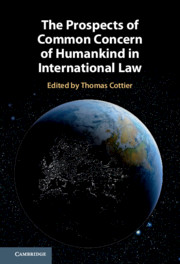Book contents
- The Prospects of Common Concern of Humankind in International Law
- The Prospects of Common Concern of Humankind in International Law
- Copyright page
- Contents
- Figures
- Contributors
- Preface
- Acknowledgements
- Abbreviations
- Part I Theory
- Part II Case Studies
- 2 Trade-Related Measures to Spread Low-Carbon Technologies
- 3 Marine Plastic Pollution as a Common Concern of Humankind
- 4 Exploring the Recognition of New Common Concerns of Humankind
- 5 Reshaping the Law of Economic Sanctions for Human Rights Enforcement
- 6 Migration as a Common Concern of Humankind
- 7 International Monetary Stability as a Common Concern of Humankind
- 8 Financial Stability as a Common Concern of Humankind
- Part III Epilogue
- Index
- References
7 - International Monetary Stability as a Common Concern of Humankind
from Part II - Case Studies
Published online by Cambridge University Press: 04 May 2021
- The Prospects of Common Concern of Humankind in International Law
- The Prospects of Common Concern of Humankind in International Law
- Copyright page
- Contents
- Figures
- Contributors
- Preface
- Acknowledgements
- Abbreviations
- Part I Theory
- Part II Case Studies
- 2 Trade-Related Measures to Spread Low-Carbon Technologies
- 3 Marine Plastic Pollution as a Common Concern of Humankind
- 4 Exploring the Recognition of New Common Concerns of Humankind
- 5 Reshaping the Law of Economic Sanctions for Human Rights Enforcement
- 6 Migration as a Common Concern of Humankind
- 7 International Monetary Stability as a Common Concern of Humankind
- 8 Financial Stability as a Common Concern of Humankind
- Part III Epilogue
- Index
- References
Summary
This chapter argues that international monetary stability is an underprovided global public good under the current design of the International Monetary System. It proposes to apply the emerging doctrine of Common Concern of Humankind (Common Concern) as a methodological approach. This chapter starts by exploring the concept of monetary stability at the different levels of governance. It is followed by a description of the doctrine of Common Concern. It continues with an analysis of the three-dimensional approach proposed by this doctrine starting with the duty to cooperate in monetary affairs both from a top-down approach (international level of governance) and a bottom-up approach (central banking cooperation). The chapter continues by examining domestic obligations concerning monetary stability with an emphasis on the special role of the central banks and also by examining some cases of unilateral actions and issues of extraterritoriality in the pursuit of monetary stability. Lastly, it offers some remarks on the most controversial aspect of the doctrine that relates to securing compliance with the obligations that may emerge from an accepted Common Concern of international monetary stability.
Keywords
- Type
- Chapter
- Information
- Publisher: Cambridge University PressPrint publication year: 2021
References
Select Bibliography
- 2
- Cited by



